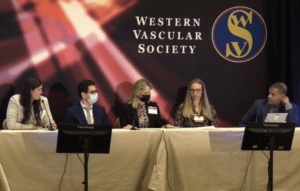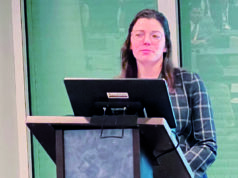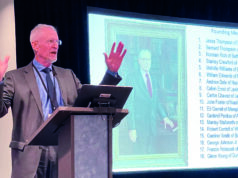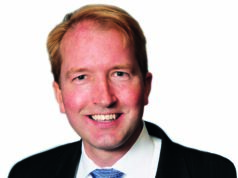
Communication and an awareness of how often vascular surgery fails emerged as key talking points during a Vascular Surgery Interest Group (VSIG) Lunch Symposium panel discussion aimed at providing trainees and medical students with career guidance during the Western Vascular Society (WVS) 2021 annual meeting in Jackson Hole, Wyoming (Oct. 16-19).
Faculty and residents provided tips on maintaining wellness, avoiding burnout, and preparing for the unanticipated challenges of vascular surgery during training. The link between surgeon wellness and the sometimes-grim realities of vascular surgery outcomes was captured by Leigh Ann O’Banion, MD, assistant professor of surgery at University of California San Francisco Fresno (UCSF-Fresno) in Fresno, California.
“You’ve watched all of these [WVS annual meeting] talks, and you’ve watched the statistics—they’re not great. It’s true: Our patients are sick, and if a pedal bypass works 50% of the time and gets healing, I’m ecstatic,” she told those gathered for the session, which also covered different types of vascular practice, match applications, research during training, and preparing for the Board exams. “But no one really prepared me for the failures. And we fail a lot in vascular surgery. That can be mentally daunting sometimes.”
O’Banion relayed to the students and residents about the times she would call fellow panelist and moderator Misty Humphries, MD, “crushed” because a patient had died, or an arduous bypass had failed. “We’re going to fail more times than we’re going to actually succeed, so I think that’s where the wellness comes in,” O’Banion told them. “We’ve really got to lean on everybody because this can be a tough job. But it’s one of the things I love most about vascular, because we do follow these patients for life.”
The panel spoke to the importance of speaking up—to mentors, faculty, and even family members—when burnout rears its head. “As residents, a lot of the variables are not in our control by any means, either financially or from a schedule standpoint,” said Elizabeth George, MD, an integrated vascular surgery resident at Stanford University Medical Center in Stanford, California. “If you’re faking it till you make it in this respect, it’s really not a tenable solution. Just make sure you’re honest with yourself. Communicate with your partners, your faculty and other trainees too.”
Humphries, an associate professor of surgery at University of California Davis Medical Center in Sacramento, California, reiterated the importance of reporting problems so that they can be fixed. “If you don’t tell me there’s a problem, I can’t fix it,” she said. “I tell this to the residents all the time. Please report your work hours accurately. Please tell me there’s a problem.”
Niten Singh, MD, the associate chief of vascular surgery at the University of Washington Medical Center in Seattle, described measures taken at his institution to stave off burnout. “In our program, we’ve instituted a policy over the last couple of years now where if somebody has been on call, has been up all night, they just go home the next day,” he said. “All the faculty have been supportive of it. The trainees were initially a little hesitant to do this because they felt like it would be a sign of weakness. I went through that generation. We started the 80-hour work week when I was towards the tail end of my training and, every week, when I was asked to report my work hours, it was 78. It wasn’t. I was there all the time. And maybe it made me a stronger person, but it made me a more tired person. One thing to remember is that if you actually speak up, and tell your program director, your faculty members—that these are important things—it will make a difference. I think it has made a difference in our program.”
The question of what medical students might not fully appreciate about vascular surgery led Jorge Miranda, MD, an integrated vascular resident at Baylor College of Medicine in Houston, to point toward the specialty’s low tolerance for error. “When you mess up in vascular surgery, the patients are going to have a big complication,” he said. “You did this anastomosis, now the bypass is down. And now you have to go back and redo it. You have to be very diligent and meticulous in what you’re doing.”
Even procedures performed perfectly on a technical level can result in failure, including within the long-term medical management and surveillance of patients after surgery, added George. “That is something I actually love about vascular surgery—the medical side, as well as the surgical side,” she said. “So if you love medicine and you love surgery, vascular surgery is a great spot.”












